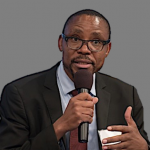In recent years, Africa has had to deal with the effects of the pandemic, growing inequality, and the threat of climate change. In addition, individual African countries have faced their own challenges. How has African philanthropy coped with these problems and what shape should it take to deal with those that lie ahead?
 This webinar was part of Alliance’s 25th anniversary series, which looks at what the future of philanthropy holds in different regions around the world. It focused on Africa, and was produced in partnership with Africa Philanthropy Network and WINGS.
This webinar was part of Alliance’s 25th anniversary series, which looks at what the future of philanthropy holds in different regions around the world. It focused on Africa, and was produced in partnership with Africa Philanthropy Network and WINGS.
Moderated by Andrew Milner, associate editor for Alliance magazine, the speakers were Stigmata Tenga, executive director of Africa Philanthropy Network; Jenny Hodgson, executive director of Global Fund for Community Foundations; Caesar Ngule, programmes director of Kenya Community Development Foundation; and Bhekinkosi Moyo, director and adjunct professor of the Centre on African Philanthropy and Social Investment at Wits Business School.
Audience poll
Follow Andrew’s opening, he kicked off the webinar with a quick audience poll, asking: what is the most urgent priority for African philanthropy over the coming decade?
- 35% of the audience voted for climate change
- 27% voted for development of livelihoods
- 20% voted for inequality
- 12% voted for education
- 0% voted for food security.
Caesar Ngule
 Caesar started by giving some background to the Kenya Community Development Foundation, and its goal to mobilize resources to ‘do development in a way that is aligned with the priorities of communities.’ The foundation does its best to ‘prioritize locally available resources’ to foster ‘home-grown solutions to local development challenges.’ This is done by supporting capacity-building initiatives for community-led organizations and working with governmental actors and policy makers.
Caesar started by giving some background to the Kenya Community Development Foundation, and its goal to mobilize resources to ‘do development in a way that is aligned with the priorities of communities.’ The foundation does its best to ‘prioritize locally available resources’ to foster ‘home-grown solutions to local development challenges.’ This is done by supporting capacity-building initiatives for community-led organizations and working with governmental actors and policy makers.
He then addressed the question of where African philanthropy is headed, stating that a flourishing African philanthropy sector must ‘grow and build on the traditional models…that are proved to work in the African context.’ He gave some examples of what’s worked well so far:
- Nurturing community philanthropy and building financial resilience
- Capacity-building and local resource mobilization through ‘influencing the attitudes of recipients of support and also of those who give’
- Improving communication, particularly using new technology and mediums such as Whatsapp groups, which have been increasingly relied upon during the pandemic
- Utilizing existing local social capital and helping communities repackage fundraising initiatives to attract philanthropy from new donors
- Creating a more friendly legislative environment so that wealthy givers feel more confident to give openly without fear of tax or legislative repercussions
Caesar highlighted some of the changes he would like to see in the sector, such as legal reform that would offer more tax incentives for giving. He also discussed the need to have more philanthropists ‘meaningfully engaged in the CSO sector’, and spoke about ‘models of accountability for individual philanthropists and donors’ which is an ‘area that still remains a little challenging.’
Caesar also addressed the question of ‘how can we use media to highlight people who are giving?’ He spoke about the need to harness the power of media to profile philanthropists and change the perception around them, as well as reaching out to younger generations of philanthropists and encouraging them to give.
Stigmata Tenga
 Stigmata began by introducing Africa Philanthropy Network, which is an ‘infrastructure and a space for African institutions and individuals to interrogate and intervene in the power dynamics that shape how resources are being mobilized, distributed and spent and how all that impacts the possibility of transformative development work within the continent.’
Stigmata began by introducing Africa Philanthropy Network, which is an ‘infrastructure and a space for African institutions and individuals to interrogate and intervene in the power dynamics that shape how resources are being mobilized, distributed and spent and how all that impacts the possibility of transformative development work within the continent.’
Africa and its diaspora have a long history of philanthropic practices that build social cohesion, address inequality and provide aid measures during crises. However, ‘historical colonial legacies in the current global political order determine the bulk of financial aid resources, that flow mainly from the global North’. These power hierarchies are ‘reproduced and sustained through gender, race and class.’ Stigmata stressed that ‘the ability to determine the terms in which philanthropic giving occurs and for what purpose has to be placed in the hands of those it saves.’
‘Money can do so much, but actually it’s about trust and connection and relationships between people.’
Systems for self-help and community giving have always existed in the continent, and have been instrumental in dealing with the pandemic. The future of philanthropy in Africa is about ‘changing our own perceptions as Africans to restructure our giving, mobilize domestic resources to ensure equitable distribution and utilization, and dismantle all structures and systems which breed injustices and inequalities.’ Lasting impact happens through ‘community-driven systems change.’
Africa is home to a growing middle-class, with ‘African consumer spending expected to have reached $1.4 billion in 2020’, offering great potential for philanthropic growth, particularly through new channels such as online giving, SMS giving, and crowdfunding. However, the sector faces major challenges as the ‘philanthropy support ecosystem is not evenly developed in the continent’ and ‘infrastructure is still weak.’
According to the WINGs 2017 report, Africa accounts for ‘only 3 per cent of the global expenditure of the field,’ while ‘72 per cent of philanthropy support organisations globally face sustainability challenges.’ Stigmata highlighted three key ways to strengthen the philanthropy infrastructure in the continent.
- Create conditions for a favourable environment for philanthropy to thrive
- Push back on shrinking space for civil society
- Shift the power to community institutions and leaders, and build resilience, trust, democracy, accountability and transparency within communities
Bhekinkosi Moyo
 Bhekinkosi Moyo was unable to attend the webinar live; however, you can watch his video contribution on the topic of African philanthropy below. He began by explaining why he believes this to be the ‘best time for African philanthropy.’ He stated that the sector is getting ‘closer and closer as a community,’ and that philanthropic achievements during the Covid -19 pandemic are testament to this.
Bhekinkosi Moyo was unable to attend the webinar live; however, you can watch his video contribution on the topic of African philanthropy below. He began by explaining why he believes this to be the ‘best time for African philanthropy.’ He stated that the sector is getting ‘closer and closer as a community,’ and that philanthropic achievements during the Covid -19 pandemic are testament to this.
He also spoke about how new research around African philanthropy is benefiting the sector, and the importance of research centres such as the Centre on African Philanthropy and Social Investment (CAPSI). CAPSI offers a range of courses on the subject, from executive education courses for professionals to postgraduate degrees and diplomas.
The third reason he gave was the ‘increased amount of giving by high-net-worth individuals.’ The African Philanthropy Forum’s new report showed that the levels of giving by high-net-worth individuals were higher in 2020 than in the past 10 years. To continue this positive trajectory, Bhekinkosi called for more giving addressing systemic issues such as ‘inequality, poverty and the different forms of exclusion and discrimination’. He suggested that the ‘future of [African] philanthropy may lie somewhere between high-net-worth individuals and community responses.’
Bhekinkosi then addressed what he believes to be the three most pressing issues that African philanthropy is currently facing:
- Climate change and biodiversity, an area where Africa is ‘still lagging behind’
- Clean energy; Africa’s weak energy infrastructure is inhibiting the development of the sector, and philanthropic support is needed to develop it
- Inequality, a big challenge that requires the ‘financing of systems and structural change.’
However, Bhekinkosi is optimistic for the sector and believes African philanthropy will be ‘an equalizer in restructuring the relations between society and the state, between local organisations and international counterparts, as well as becoming a gamechanger in policy development, sustainable development and addressing systemic and structural inequalities in Africa.’
Jenny Hodgson
 Jenny began by reflecting on the Global Fund for Community Foundations’ (GFCF) decision to establish its base in South Africa, a place where ‘there are systems of self-help and solidarity, but also where the negative impacts of formal development aid have been felt very strongly.’
Jenny began by reflecting on the Global Fund for Community Foundations’ (GFCF) decision to establish its base in South Africa, a place where ‘there are systems of self-help and solidarity, but also where the negative impacts of formal development aid have been felt very strongly.’
She noted how far the conversation around African philanthropy has progressed in the last 20 years, highlighting the growth of a body of research from centres such as CAPSI, infrastructure organisations such as the Africa Philanthropy Network, and practising institutions that have now reached a certain level of maturity.
She described how during the Covid-19 pandemic, people were forced to rely on systems of community solidarity and self-help, as the ‘formal development system was shown to be lacking in many ways.’ She stated that ‘African philanthropy has a critical role to play in designing that alternative system, where civil society is owned, resourced and supported by the people it’s meant to serve’ with ‘systems and structures that can serve people rather than the needs of funders.’
Jenny discussed the ‘dynamics of power among high-net-worth private philanthropists,’ and the need to ‘build intersections between different segments of communities,’ to foster trust between civil society and local philanthropists. It is here that more ‘democratic, participatory types of philanthropy’ have a role to play, to ‘enable an independent civil society that is able to speak out on…corruption, abuse of power, abuse of human rights. This is really a strategy for civil society to have constituencies of local supporters…to enable it to speak out on behalf of ordinary people.’
She also spoke about the need to overcome the tendency to ‘oversimplify and romanticise communities…and to demonise them.’ Philanthropy is still ‘not seen by the mainstream system of development…as a strategy for driving development’ which means that it continues to be ‘dismissed and undervalued.’
Engaging people to ‘choose to deploy their resources in pursuit of something collective… this is really about amplifying voice, promoting collective action.’ She stated that to do this effectively, we must ‘overcome the cognitive disconnect where somehow there is a better system associated with international funding and an informal system that people don’t seem to be able to bring to the stage.’ She concluded by reminding us that ‘money can do so much, but actually it’s about trust and connection and relationships between people.’
Audience poll
The second poll question was: what do you think is the most important thing needed to develop African philanthropy?
- 51% voted for more community-based and local resource mobilisation
- 22% voted for more favourable conditions for giving
- 20% voted for more engagement and giving by wealthy individuals
- 2% voted for more research, advisory and representative bodies.
Q&A
The first question came from Eshban Kwesiga, who asked: what would re-imagining accountability look like?
Caesar Ngule spoke about his experience at KCDF, and how accountability is defined through levels of engagement from local funders and philanthropists. He defines it ‘in the terms of every individual funder on board – what is it that you’re looking for so that you feel engaged, to get the results you want?’
Stigmata added her own definition of accountability: ‘when people contribute to their own development, they become more interested and invested in ensuring that there is change…they take more of a role in collective responsibility.’ To her, accountability is the freedom of choice for people to invest in the areas where they think development is needed, to contribute to and bring about the change they want to see.
Alan Fowler asked: is high wealth and corruption a problem in giving in Africa?
Stigmata Tenga spoke about how recent research is showing that high-net-worth individuals in Africa often ‘do not support development directly through civil society organizations…they will support through government and politicians because of their own interests.’ This, she believes, is corruption.
Africa is home to a growing middle-class, with the African consumer spending expected to have reached $1.4 billion in 2020, offering great potential for philanthropic growth, particularly through new channels such as online giving, SMS giving, and crowdfunding.
She also addressed tax incentives, stating that having an ‘enabling environment is important…however most philanthropy takes place outside the tax system.’ She says that there must be a conducive environment for tax incentives that would motivate high-net-worth individuals to give, while also reducing the inequality gap.
Mike O’maera at EAPN asked: An independent civil society capable of taking on peers and Government will need to have robust systems and independent resource streams that cannot be threatened by either corrupt individuals or rogue governments. How do we achieve this at the level of the continent?
Jenny took this question, answering that we ‘need to invest in the architecture that allows that to happen’ and use organic, community-based giving as a basis for more ‘strategic, joined-up structures that can take on these more critical issues.’
She then referenced the issue around tax that Stigmata spoke about, adding: ‘if you encourage people to give, then you can also create the opportunity for them to experience being heard… it’s a way to unlock that social muscle, to move from the private to the more public domain.’ The sharing of knowledge, positive examples and lessons learned is imperative for ‘building the alternative narrative we want, in order to have a robust civil society that can hold government to account.’
Leila Davids from Philanthropy Africa asked: how can we encourage and support African philanthropists to collaborate, co-fund and avoid duplication of effort?
Caesar Ngule answered that one challenge they face is the ‘capacity to do good analysis and mapping of different philanthropists.’ He also noted that wealthy funders are usually comfortable in their own networks, so encouraging them to fund new areas and collaboratives can be a challenge.
Steve Ogutu, from the Movement of Community-led Development Kenya, asked: In Kenya, philanthropy is largely known for in-kind donations. How can we make philanthropy work structured and have philanthropists intervene in community initiatives with huge sustainable impact?
Caesar Ngule addressed this by saying that particularly with grassroots, community philanthropy, ‘people tend to give land, people tend to give what they immediately have.’ He spoke about how KCDF has ‘invested in the capacity of CSOs…to translate in-kind donations to cash donations’ that can provide more flexibility. While he thinks Kenyans have not struggled to raise in-kind donations, more must be done ‘to tap into different opportunities for cash donations…to complement the in-kind contributions.’ KCDF has done this through incentivized grant-matching schemes.
Gus Ege asked: do you think African cultural practices help or hinder African philanthropy?
Stigmata stated that the historical existence of ‘values and principles of solidarity…of reciprocity, which have always built such cohesion in the continent,’ supports philanthropy in the way Africans are defining it, though this may be different to how the global North may define it.
Final thoughts
To conclude the webinar, panellists gave their final remarks. Jenny began by saying ‘this is a hugely important, vibrant and emergent space,’ but the ‘sector is still spread very thin.’ It needs investment in ‘long term systems and structures that will last.’ To do this, bringing in ‘funders and allies and supporters that can buy into that vision of the future is critically important.’
Caesar said his takeaway from the session is the fact that the conversation has shifted to African-driven forms of philanthropy and fundraising, rather than fundraising from other parts of the world. ‘The question of what motivates different philanthropists…and the capacity for African CSOs to do that analysis is key.’ He added that conversations around accountability must remain on the agenda.
Stigmata spoke about the ‘need for leadership to support civil society institutions’ to better respond to the needs of the continent, as well as the importance of building infrastructure, and collaboration both within and beyond Africa. She emphasized the importance of supporting grassroots institutions that can better respond to and assess the needs of the communities they serve, and ‘centring community philanthropy… to bring transformation to marginalized and unheard voices.’
Watch the recording of the full webinar below
If you enjoyed this, sign up to our free newsletter to be the first to hear about our upcoming webinars. The next webinar in the series will take on 18 August, and will focus on Black women leading in philanthropy.
You can also learn more about our upcoming 100th issue and 25th anniversary celebrations here.



Comments (0)